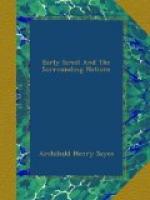Israel perished while Judah survived. Dynasty after dynasty had arisen in it; its capital had been shifted from time to time; it did not even possess a religious centre. Before a line of kings had time to win the loyalty of the people they were swept away by revolution, and the army became the dominating power in the state. There was no body of priests to preserve the memory of the Mosaic Law and insist upon its observance, and the prophets who took their place protested in vain against the national apostasy. Alliance with the neighbouring kingdom of Phoenicia brought with it the worship of the Phoenician Baal, and Yahveh was forsaken for a foreign god. In B.C. 722 Samaria, the later capital of the country, was taken by the Assyrian king Sargon, and northern Israel ceased to be a nation.
Judah, on the other hand, successfully defied the Assyrian power. The invasion of Sennacherib was rolled back from the walls of Jerusalem, and though the Jewish kings paid tribute to Nineveh, they were left in possession of their territories. Edom, indeed, had long since been lost, and with it the trade with the Arabian seas, but the Philistines continued to acknowledge the supremacy of Judah, and commercial relations were kept up with Egypt. It was not until the Babylonian empire of Nebuchadrezzar had arisen on the ruins of that of Assyria that Jerusalem and its temple were destroyed, and the Davidic dynasty passed away. But they had accomplished their work; a nation had been created which through exile and disaster still maintained its religion and its characteristics, and was prepared, when happier days should come, to return again to its old home, to rebuild the temple, and carry out all the ordinances of its faith. From henceforth Judah realised its mission as a peculiar people, separated from the rest of the world, whose instructor in religion it was to be. More and more it ceased to be a nation and became a race—a race, moreover, which had its roots in a common religious history, a common faith, and a common hope. Israel according to the flesh became Israel according to the spirit.
[Footnote 1: See Pinches in the Journal of the Royal Asiatic Society, July 1897. In a tablet belonging to a period long before that of Abraham, Isma-ilu or Ishmael is given as the name of an “Amorite” slave from Palestine (Thureau-Dangin, Tablettes chaldeennes inedites, p. 10).]




